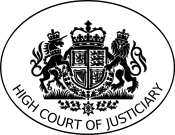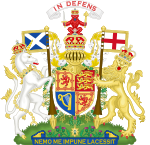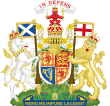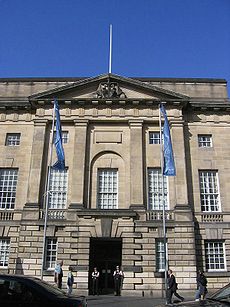- High Court of Justiciary
-
High Court of Justiciary 
Royal Coat of Arms in ScotlandEstablished 1672 Jurisdiction Scotland Location Parliament House, Edinburgh Composition method Appointed by Monarch with name presented by the First Minister of Scotland following the Judicial Appointments Board for Scotland Authorized by Act of Parliament of Scotland Decisions are appealed to None Judge term length ad vitam aut culpam Number of positions 34 Website www.scotcourts.gov.uk Lord Justice General Currently Lord Hamilton[1] Since 2nd December 2005 The High Court of Justiciary is the supreme criminal court of Scotland.
The High Court is both a court of first instance and a court of appeal. As a court of first instance, the High Court sits mainly in Parliament House, or in the former Sheriff Court building, in Edinburgh, but also sits from time to time at various other locations in Scotland. As a court of appeal, it sits only in Edinburgh.[2]
The High Court of Justiciary once sat apparently outwith Scotland, at Zeist in the Netherlands during the Pan Am Flight 103 bombing trial (see Scottish Court in the Netherlands). However, the court precincts were temporarily made British territory under Scottish Law for the duration of this case.
Contents
Judges
The individuals who sit in the High Court often hold a seat simultaneously in Scotland's civil court system.
The judges of the High Court are the same ones who sit in the Court of Session, Scotland's supreme civil court. The Court of Session's Lord President is also the High Court's Lord Justice General. The Lord Justice Clerk holds his or her office in both courts. The remaining judges are referred to as Lords Commissioners of Justiciary in the context of the High Court, and Lords of Council and Session or Senators of the College of Justice in the context of the Court of Session.
First instance jurisdiction
When sitting as a court of first instance, that is, when hearing a case for the first time rather than on appeal, a single Lord Commissioner of Justiciary usually presides (although two or more judges may sit in important or difficult cases) with a jury of fifteen individuals. Under the Scottish legal system, the jury need not return a unanimous verdict; a majority verdict may also be used. The Scottish legal system also permits a verdict of 'not proven' as well as verdicts of 'guilty' or 'not guilty'.
The High Court has jurisdiction over all crimes in Scotland unless restricted by statute. In practice, however, the High Court generally deals with crimes, such as murder and rape, in which it has exclusive jurisdiction, as well as other serious crimes.
Appellate jurisdiction
Scots law

This article is part of the series:
Law of ScotlandAdministrationCivil courtsCriminal courts- High Court of Justiciary
- Sheriff Court
- Justice of the Peace Court
Special courtsCriminal prosecution- Lord Advocate
- Crown Office
- Advocate Depute
- Procurator Fiscal
-
-
- Fiscal fine
- Precognition
-
Legal profession- Faculty of Advocates
- Law Society of Scotland
- Solicitor-Advocate
- Solicitor
- Association of Commercial Attorneys
Appeals may be made to the High Court of Justiciary sitting as the Court of Criminal Appeal from the lower courts in criminal cases. An appeal may also be made to the High Court if the High Court itself heard the case at first instance. Two judges sit to hear an appeal against sentence, and three judges sit to hear an appeal against conviction.
There is no further appeal from the High Court's decision on appeal (that can be made to or heard by the High Court). Appellants who still wish to pursue their appeal may petition the Scottish Criminal Cases Review Commission, who have the authority to refer an appeal back to the High Court, if they determine that a miscarriage of justice has occurred. Appellants are also entitled to lay their appeals before the UK Supreme Court and the European Court.
History and founding
The High Court was founded in 1672, but its origins derive from the College of Justice, as well as from the medieval royal courts. The medieval Justiciar (royal judge) took its name from the justices who originally travelled around Scotland hearing cases on circuit or 'ayre'. From 1524, the Justiciar or a deputy was required to have a "permanent base" in Edinburgh, and as such the College of Justice was established in Edinburgh in 1532.
References
- ^ "Lord Hamilton is new Lord President". The Journal of the Law Society of Scotland (Connect Communications (Scotland) Limited). 2005-11-24. http://www.journalonline.co.uk/news/1002497.aspx. Retrieved 2008-07-15.
- ^ "Scottish Court Service - High Court of Justiciary". Scottish Court Service. http://www.scotcourts.gov.uk/justiciary/index.asp. Retrieved 2009-09-09.
See also
- William Roughead, between 1889 and 1949 attended every murder trial of significance held in the Court.
- Courts of Scotland
- List of Senators of the College of Justice
- List of leading Scottish legal cases
- Scottish Court in the Netherlands
External links

Other judges Other Officers Advocates · Solicitor-advocates · Writers to the Signet · Society of Solicitors in the Supreme Courts of ScotlandBuildings Lords Commissioners of Justiciary Senior Judiciary 
Other Judiciary Lord Nimmo Smith · Lord Kingarth · Lord Eassie · Lord Reed · Lord Osborne · Lord Wheatley · Lady Paton · Lord Carloway · Lord Clarke · The Lord Hardie · The Lord Mackay of Drumadoon · Lord Menzies · Lord Drummond Young · Lord Emslie · Lady Smith · Lord Brodie · Lord Bracadale · Lady Dorrian · Lord Hodge · Lord Macphail · Lord Glennie · Lord Kinclaven · Lord Turnbull · The Lady Clark of Calton · Lord Brailsford · Lord Uist · Lord Malcolm · Lord Matthews · Lord Woolman · Lord Pentland · Lord Bannatyne · Lady StaceyAdministration Scottish Government · Cabinet Secretary for Justice · Judicial Appointments Board · Scottish Children's Reporter Administration
Scottish Criminal Cases Review Commission
Crown Office · Lord Advocate · Solicitor General for Scotland
Scottish Court Service · College of Justice · Act of Sederunt · Office of the Public Guardian
Judges Civil courts Criminal courts Legal profession Categories:- High Court of Justiciary
- 1672 establishments in Scotland
- Category A listed buildings in Scotland
- Listed buildings in Edinburgh
Wikimedia Foundation. 2010.

